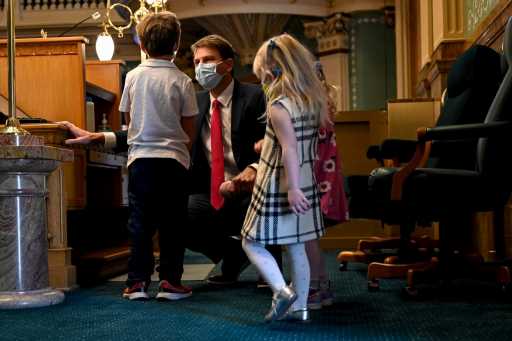On opening day of session, Colorado lawmakers vow to address crime, housing costs, spending and more
Colorado’s 2022 legislative session started Wednesday under the shadow of a still critical pandemic, and with party leaders primed to spend months debating how to apportion a historically flush state budget, and make the state safer and more affordable.
The parties identify many of the same pressing problems, but present largely opposing ideas to address them. For the fourth straight year, however, Democrats control both the state House and Senate, plus the governor’s office, so they can always claim final say if they want it.
It’s evident once again that the COVID-19 pandemic is one subject area with little common ground. The politicization of this pandemic was evident as Democrats in both chambers donned masks and all but a couple Republicans did not. Health care workers administered rapid virus tests outside the Capitol, and guests — unlike lawmakers — were required to mask up indoors. However, partitions between lawmakers’ desks that were taken down at the end of last year’s session did not go back up.
“Health care and public health will continue to guide many of the decisions we make in this building,” House Speaker Alex Garnett of Denver said. “Despite our exhausting and fatigue, COVID has not relented yet.”
This is the final year for many term-limited staples of Colorado state politics, including Garnett, Senate President Leroy Garcia of Pueblo, Senate Minority Leader Chris Holbert of Douglas County and House Majority Leader Daneya Esgar of Pueblo.
In their opening-day speeches, both Holbert and House Minority Leader Hugh McKean of Loveland argued that Colorado has become less affordable and safe, with students falling behind in their education.
Holbert promised that his caucus would bring forth bills to allow “struggling Coloradans” to deduct rent from their income taxes, and to exempt food from state sales taxes. He said the caucus would bring a bill to hire more police officers and to fully pay off longstanding state debt to the public K-12 system.
McKean pledged to fight for Coloradans’ costs of living to go down by “eliminating excessive taxes and fees” and a return to “the broken window theory of policing that puts an emphasis on all our laws,” focused on increased training and reporting for police.
Garcia, in his speech, was more sweeping and included fewer policy specifics than Holbert. He did allude to the fact that this legislature’s work will be largely defined by the historic influx of about $4 billion in federal stimulus money, which gives lawmakers about 10 times the discretionary spending power this year than in previous years.
“It has become somewhat of a tradition for the Senate president to declare on opening day that this upcoming session will be the most consequential in history,” Garcia said. “That declaration has never felt more appropriate, … with a once-in-a-lifetime gift that that puts the wind at our backs as we choose how to shape Colorado’s future.”
Garnett applauded policies passed last year to make health care more affordable for Coloradans and said lawmakers would continue that work this year. He added that lawmakers would work on passing bills to make historic investments in education, affordable housing and mental and behavioral health, and that they would introduce bills to address “pandemic-induced crime” through policies to prevent crime and reduce recidivism.
“If we do our jobs as well as I know we can, then we will be treating the underlying causes of the afflictions that face our state, not just managing the symptoms,” he said.
He also focused a significant portion of his speech on addressing “the creeping menace of climate change,” calling for holding polluters accountable, improving permitting and monitoring systems and reducing emissions.
Source: Read Full Article




